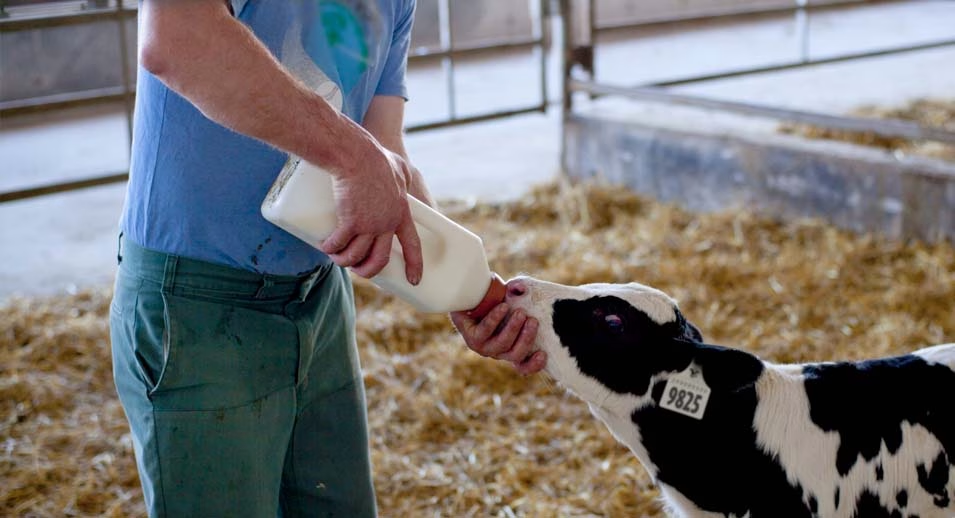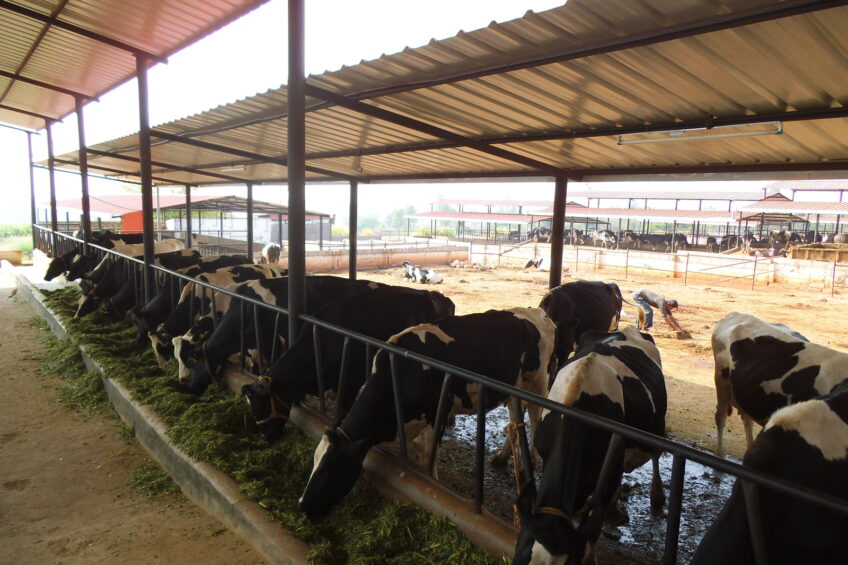Find out how much colostrum impacts calf health. Are Holstein or crossbreds better off? See the surprising results that might change your farm practices.
Summary: This article explores the impacts of colostrum quantity on calf health and immune system development, comparing Holstein and Holstein × Angus breeds. The study used two different colostrum replacer treatments: a low quantity providing 2.5 g of IgG/kg and a high quantity providing 5.0 g of IgG/kg. While breed had no significant effect on overall health or lymphocyte populations, the amount of colostrum did influence immune cell profiles. HI calves showed tendencies for higher proportions of certain B cells, suggesting that increased colostrum intake in early life is beneficial for immune development. The article emphasizes the importance of colostrum management over breed differences for improving calf health.
- Higher colostrum intake leads to better immune cell profiles in calves.
- Breed differences (Holstein vs. Holstein × Angus) had no significant impact on overall calf health or lymphocyte populations.
- HI calves had higher proportions of certain B cells, indicating enhanced immune development.
- Effective colostrum management is crucial for improving calf health, regardless of breed.
- The study highlights the importance of prioritizing colostrum quality and quantity over breed selection.

The initial few hours of a calf’s existence may influence its future health. It all starts with colostrum, the first milk the mother makes after giving birth. This nutrient-dense material is more than simply a meal; it is the primary defense for newborn calves, shielding them from many infections. Colostrum is like liquid gold for newborn calves. It contains immunoglobulins, vital nutrients, and growth factors necessary for developing a robust immune system. But how much colostrum is sufficient? Does the calf’s breed make a difference? These questions are essential for managing your dairy farm effectively. Subsequent research of these same concerns looked at how much colostrum and which breeds affected the health and lymphocyte profiles of Holstein and crossbred calves. The results may surprise you and provide fresh insights into improving the health of your herd.
Colostrum: The Supercharged First Meal Every Calf Needs
Imagine colostrum as a newborn calf’s first and most important meal. Colostrum is a nutrient-dense, creamy material the mother cow produces before and after giving birth.
Think of it as a natural shield. When a calf is born, its immune system is like a blank slate, making it susceptible to infections and illnesses. Colostrum acts like a superhero, supplying crucial immunoglobulins—think of them as tiny warriors who protect the calf’s body immediately. IgG plays a vital role because it forms the majority of immunoglobulins and helps the calf fight against possible infections.
In addition, colostrum is high in protein, fat, vitamins, and minerals. It’s like giving the calf an immediate energy boost, a jumpstart on their existence. This nutritious foundation is critical to their growth and development. Without this initial injection of colostrum, calves are substantially more vulnerable to diseases and developmental setbacks, as if they were left without armor on a battlefield.
In summary, colostrum is more than simply a calf’s first meal; it is its lifeblood. Making sure kids receive enough of this precious nectar in their first few hours of existence is more than a chore; it’s a mission. It’s the finest foundation kids can have for a healthy and prosperous future, and it’s a duty we must all accept.
How Much Colostrum is Enough? A Deep Dive into Calf Health and Immunity
M. Kovacs*, H. McCarthy, T. Chaplain, L. R. Cangiano, D. L. Renaud, and M. A. Steele conducted the study “Effects of breed and colostrum quantity on health and lymphocyte populations in the blood of Holstein and crossbred calves” to investigate the impact of breed and colostrum quantity on the health and lymphocyte profiles in the blood of dairy calves during their rearing phase. The study focused on male Holstein and Holstein × Angus calves, separating them into groups receiving low or high amounts of colostrum replacer. The low amount gave 2.5g of IgG/kg body weight, while the large quantity provided 5.0g of IgG/kg body weight. The careful results of this research will help you better grasp calf health and immunology.
Researchers carefully tracked calf health using criteria such as fecal consistency and respiratory health ratings. Fecal consistency scores are a clear sign of gastrointestinal health. Diarrhea, for example, may cause dehydration, nutritional malabsorption, and poor overall development. Tracking feces twice daily allows researchers to immediately detect and treat abnormalities that may affect calf intestinal function and general health.
Respiratory health scores are another important measure. Calves are especially vulnerable to respiratory infections, which may impair development and raise death rates. Recording respiratory health scores enables early identification of symptoms, including coughing, nasal discharge, and difficulty breathing. Monitoring these signals allows farmers to respond quickly with treatments or management modifications to reduce the burden of respiratory infections and improve their animals’ long-term health and production.
Unlocking the Immune System: How Colostrum Shapes Calf Immunity
Lymphocytes are essential to the immune system. These white blood cells serve as the body’s first line of defense against infection. They appear in various sorts, including B and T cells, each with a distinct immunological role. For example, B cells generate antibodies, but T cells target infected cells directly.
The outcomes of this research provided insight into how the amount of colostrum administered to calves affects their lymphocyte profiles. Calves given a larger quantity of colostrum replacer (HI) had a higher percentage of IgM+ B lymphocytes expressing critical markers such as CD21 and CD32. This indicates a more robust early immunological response than those on the reduced colostrum replacer (LOW) diet. Interestingly, the LOW group had a more significant percentage of γδ T cells expressing WC1.1, but breed differences did not substantially impact total lymphocyte profiles.
In layman’s words, giving calves more colostrum soon after birth might impact their immune system development, perhaps making them more resistant to infections in their early stages of life. The particular changes in lymphocyte composition highlight subtle ways in which early diet might influence long-term health consequences in dairy calves.
The Hidden Goldmine in Calf Health: Quality Over Breed
As any experienced dairy farmer will tell you, every detail counts regarding your calves’ health. Our newest research found that the amount of colostrum received by the calf, rather than the breed (Holstein or Holstein × Angus), significantly impacted health indicators.
Given the historical arguments over breed performance, this may come as a surprise. Our findings indicated no significant breed differences in diarrhea or respiratory illness incidence. Calves that were given more colostrum replacer, on the other hand, had better immunological profiles. HI, calves receiving 5.0 g of IgG/kg body weight had more beneficial IgM+ B cells and fewer γδ T cells associated with health concerns.
So, how does this impact your dairy farm? Prioritizing high-quality, high-quantity colostrum consumption in the first 12 hours of life may result in healthier, more muscular calves, regardless of breed. This discovery suggests a change in emphasis from breed selection to early-life nutrition optimization, which might be a game-changing technique for boosting calf health and farm output.
Colostrum Quantity: The Real X-Factor in Calf Immunity and Health
- High quantity (HI) of colostrum replacer (CR) increased the proportion of IgM+ B cells expressing CD21 and CD32 compared to the low quantity (LOW) group.
- LOW calves showed a higher proportion of γδ T cells expressing WC1.1 than those in the HI group.
- Breed did not significantly affect the proportion of days with diarrhea or respiratory disease.
- No substantial impact of breed on lymphocyte profiles in blood was observed.
- Overall health and lymphocyte populations in calves were influenced more by colostrum quantity than by breed.
Expert Insights: Translating Findings into Practice
So, how do these results affect your dairy farm? The research unambiguously confirms the importance of colostrum quantity versus breed in determining calf health and immunity. This insight redirects our attention away from genetic predispositions and toward dietary therapies, which are more straightforward to regulate and improve.
First, consider the apparent evidence: calves fed more colostrum replacer (HI) had a more robust immunological profile, as seen by greater proportions of IgM+ B cells expressing CD21 and CD32. This shows that giving your calves a suitable amount of colostrum replacer during the first 12 hours of life might significantly improve their immunological health throughout the raising period.
So, how much colostrum should you aim for? The research used 5.0 g of IgG/kg body weight for the HI therapy. That is your gold standard. Ensure that every newborn calf receives this recommended amount to lower the risk of illnesses such as diarrhea and respiratory infections, which were observed but showed no significant changes in occurrence depending on quantity.
Given these insights, here’s some practical advice:
- Timely Colostrum Feeding: Colostrum should be administered within the first 12 hours of birth. This window is crucial for maximizing immunity.
- Monitor Individual Calves: Not all calves will readily intake the required amount. Tube feeding ensures they receive the needed dosage.
- Quality Control: Your focus shouldn’t just be on quantity but also the quality of colostrum. Aim for at least 50 g/L of IgG concentration [Mee, 2008].
- Regular Health Checks: Though the study did not find breed differences, keeping a close watch on health metrics such as fecal consistency and respiratory scores can help early identification and management of issues.
Finally, while the study provides significant insights, larger sample sizes could reveal more detailed patterns. But for now, focusing on colostrum management offers a tangible way to improve calf health, giving them a strong start and eventually leading to a healthier, more productive herd.
By incorporating these practices, you’re not just feeding calves but building a foundation for a healthier future herd. So, are you ready to make colostrum a top priority?
The Bottom Line
As previously discussed, colostrum’s function in calf health is not a hypothesis but a confirmed reality. The right amount of colostrum may significantly impact your calves’ early immunological development and general well-being, laying the groundwork for their future production. Breed may not be necessary, but the quantity of colostrum indeed is. Do you give your calves the most fantastic start in life? The evidence supports the necessity of colostrum in the early hours after birth, and your calves’ future—and perhaps your farm’s success—may rest on it.













